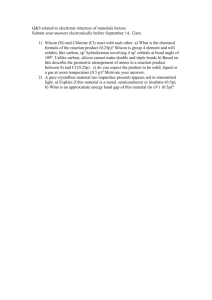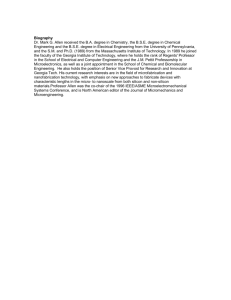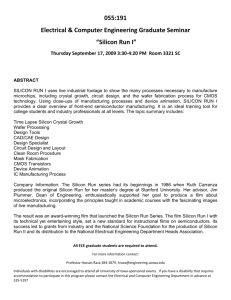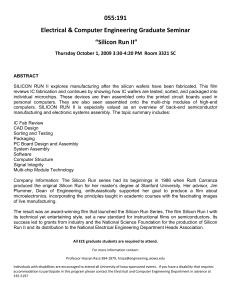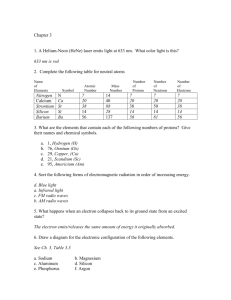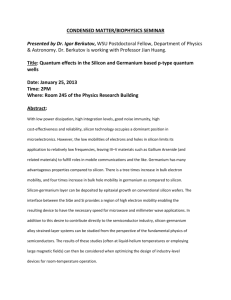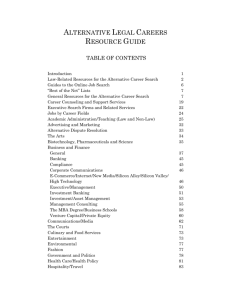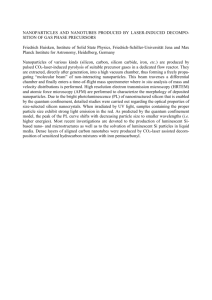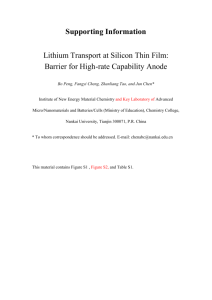Presentation of ferro-alloys sector
advertisement
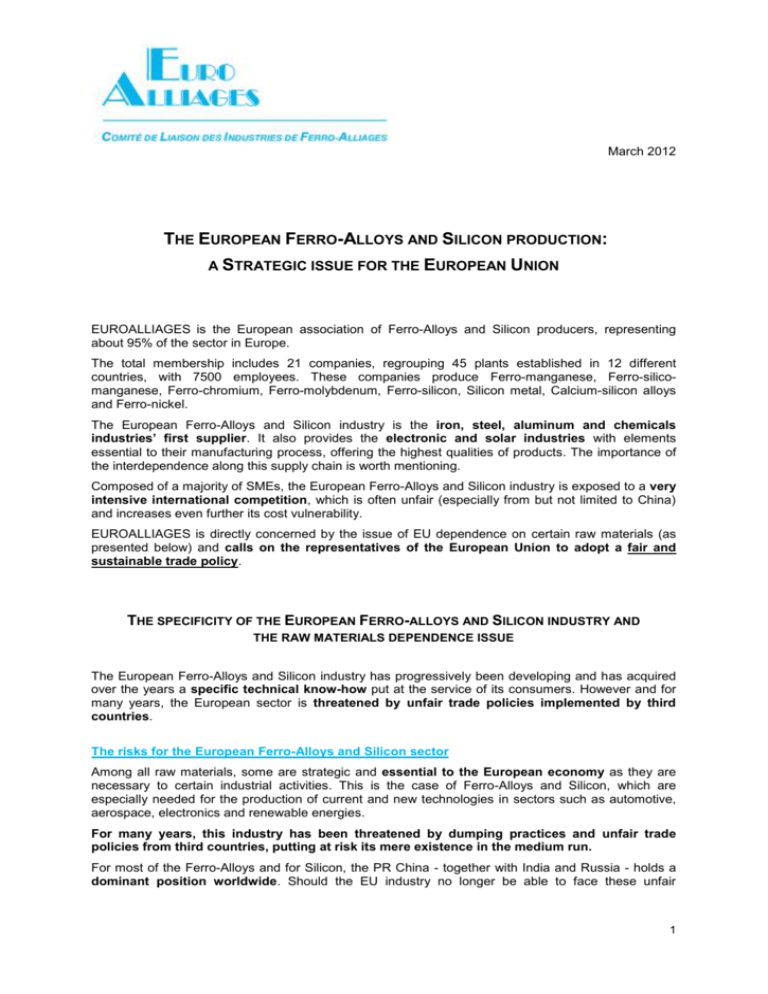
March 2012 THE EUROPEAN FERRO-ALLOYS AND SILICON PRODUCTION: A STRATEGIC ISSUE FOR THE EUROPEAN UNION EUROALLIAGES is the European association of Ferro-Alloys and Silicon producers, representing about 95% of the sector in Europe. The total membership includes 21 companies, regrouping 45 plants established in 12 different countries, with 7500 employees. These companies produce Ferro-manganese, Ferro-silicomanganese, Ferro-chromium, Ferro-molybdenum, Ferro-silicon, Silicon metal, Calcium-silicon alloys and Ferro-nickel. The European Ferro-Alloys and Silicon industry is the iron, steel, aluminum and chemicals industries’ first supplier. It also provides the electronic and solar industries with elements essential to their manufacturing process, offering the highest qualities of products. The importance of the interdependence along this supply chain is worth mentioning. Composed of a majority of SMEs, the European Ferro-Alloys and Silicon industry is exposed to a very intensive international competition, which is often unfair (especially from but not limited to China) and increases even further its cost vulnerability. EUROALLIAGES is directly concerned by the issue of EU dependence on certain raw materials (as presented below) and calls on the representatives of the European Union to adopt a fair and sustainable trade policy. THE SPECIFICITY OF THE EUROPEAN FERRO-ALLOYS AND SILICON INDUSTRY AND THE RAW MATERIALS DEPENDENCE ISSUE The European Ferro-Alloys and Silicon industry has progressively been developing and has acquired over the years a specific technical know-how put at the service of its consumers. However and for many years, the European sector is threatened by unfair trade policies implemented by third countries. The risks for the European Ferro-Alloys and Silicon sector Among all raw materials, some are strategic and essential to the European economy as they are necessary to certain industrial activities. This is the case of Ferro-Alloys and Silicon, which are especially needed for the production of current and new technologies in sectors such as automotive, aerospace, electronics and renewable energies. For many years, this industry has been threatened by dumping practices and unfair trade policies from third countries, putting at risk its mere existence in the medium run. For most of the Ferro-Alloys and for Silicon, the PR China - together with India and Russia - holds a dominant position worldwide. Should the EU industry no longer be able to face these unfair 1 conditions of competition, downstream users would then become completely dependent from an unreliable source of supply, in oligopolistic conditions, subject to State intervention. This scenario has already happened regarding the production of Magnesium (see below). By ignoring the competition conditions with newly industrialised economies, the European economy runs the risk to increase its dependence vis-a-vis third countries for strategic materials and their related downstream user sectors. The European trade balance for Ferro-Alloys and Silicon products is already in deficit. This dependence should not be increased any further, especially at a time when the global European trade balance is also negative. The European raw materials policy should therefore be articulated in such a way that the European based Ferro-Alloys and Silicon industry’s interests and concerns are addressed in a balanced way. The Chinese unfair trade policy leads to the closure of European plants and to the increase of EU dependence: the Magnesium example For many years, China has been selling at dumped prices a series of commodities The country’s sales pattern is to create artificial prices’ volatility, in a framework of abnormally low (and in fact subsidized) cost structure. As a consequence thereof, European producers have been forced to shut down their respective sites hence giving the possibility to Chinese companies to raise their prices, taking advantage of their new dominant position. The Pechiney plant in Marignac (France) used to be a competitive producer of unwrought Magnesium. Further to an untenable unfair competition of China which lasted many years, the Marignac plant was forced to stop Mg production in June 2001. This situation ended up with the definitive closing down of the Marignac site on July 2nd 2002. As a consequence to the plant closure, 256 persons were left unemployed. Moreover, this closure left the EU with no primary Magnesium production and has created a total dependence towards China. Today and not surprisingly, Magnesium is classified as a critical raw material by the European Commission. If the European Union does not take the necessary steps to address in a balanced and sustainable way the concerns the European Ferro-Alloys and Silicon industry, the risk of becoming 100% dependent on third countries’ supply is high. Highlighting the standards of the European Ferro-Alloys and Silicon Industries: an emergency which requires immediate action The European industry, integrated from the mines to the production of specific metals and metal byproducts, implements very high standards compared to third countries’ industries, thus showing a responsible behaviour at global scale. Nevertheless, these standards do entail higher costs and therefore call for the establishment of a level playing field between EU operators and their competitors who are not subject to the same rules and constraints: Environment and climate action Out of all world players, the EU has the highest environmental standards. EU companies are ranked among the top companies investing in environmental protection and innovative technologies. They also abide by the quite stringent EU Energy rules and policy. Social standards, safety and occupational health Regarding the key issue of safety and occupational health, the EU Ferro-Alloys and Silicon industry provides its employees and consumers with the highest standards, which is not the case of most of its international competitors. Technology, Research, Development and Innovation The Ferro-Alloys and Silicon industry uses advanced, resource and energy efficient technologies for the processing steps of minerals and secondary raw materials (such as metals). It also invests, where technological progress is possible, in R&D&I work. 2 Recycling of Ferro-Alloys Waste materials also represent a key source of supply for the ferro-alloys recycling activities. Today the environmental and social standards in third countries are very often less efficient than those applied in the EU. However huge waste material volumes are processed in those third countries, resulting in a negative global environmental impact. Access to waste is a key point for EUROALLIAGES, which calls on the European Union to ensure the control of its waste and to put in place the necessary policies that aim at avoiding waste leakage. The EU environmental, social and research and development-related standards are not globally binding and create in fact a competitive disadvantage for the EU industry as compared with their competitors which are not subject to the same rules. The lack of binding implementation at international level remains a concern for the EU Ferro-Alloys and Silicon industry. THE NECESSITY OF A FAIR AND SUSTAINABLE INTERNATIONAL TRADE FRAMEWORK The European Union should be able to both preserve the know-how and the quality of its products and to build a policy on raw materials that does not jeopardise the European based commodity production. For these reasons, EUROALLIAGES calls for: The inclusion of measures creating a more appropriate level playing field in international trade policies, accompanying the raw materials strategy in order not to put at risk the European industrial network, taking into consideration not only the export restrictions, but also the subsidy schemes in third countries as well as the environmental and social framework production conditions; A more balanced approach regarding the standards applicable to EU companies, which face competitors that do not share their respect of ambitious environment, social and R&D&I policies; Finally, for all energy-intensive industries, maintaining internationally competitive energy prices is of vital importance. The manufacturing of products which are strategic for the European economy (e.g. in the automotive, aerospace, electronics, renewable energy sectors) requires the best quality of Ferro-Alloys and Silicon products: these products are manufactured in Europe. Today, it is therefore imperative for the EU to ensure fair and sustainable international trade conditions that preserve the competitiveness of the European industry. EUROALLIAGES would be glad to contribute to such an in-depth reflection exercise. For further information, please contact: Inès VAN LIERDE Secretary General EUROALLIAGES Tel.: +32 2 775 63 02 vanlierde@euroalliages.be 3 March 2012 4
